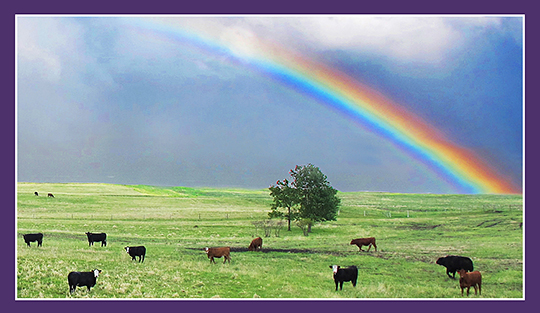
Countering bigotry with Stoney wisdom about shared humanityCOFFEE WITH WARREN, with Warren Harbeck |

|
Cattle south of Cochrane safely graze beneath a rainbow of diverse colours, a lesson in the beauty of our shared humanity. Photo by Warren Harbeck Recent outbreaks of bigotry-driven violence have prompted me to revisit two humanity-saving lessons I’ve learned from Stoney Nakoda First Nations elders at Morley over the years. The first is a lesson I learned over 50 years ago from the late Chief Walking Buffalo (George McLean) about one of the most important values in his Stoney Nakoda culture. Consider all the different kinds of trees and plants there are in the forest, the globetrotting goodwill ambassador often said. There are poplars, spruce, pine, willow, cranberry, and a wide variety of flowers. But they don’t fight with each other. They get along together just fine; they live in harmony. The beauty of that harmony when it is found among people is expressed in the Stoney Nakoda language by the wonderful word, oyade, “town” or “community,” he said. This is also the word for “peace.” Thus, a community is a place where peace and harmony prevail. (For pronunciation of Stoney words, see my Jan. 26, 2017 column.) The implications for our lives together here in our ethnically diverse part of the Bow Valley were made abundantly clear to me 22 years ago by Henry Holloway, then chief of the Chiniki First Nation. It was a beautiful late-June Saturday morning at Cochrane Ranche, and folks from throughout the Bow Valley were gathered for the Cochrane Aboriginal Recognition Event. Tepees from Morley were set up, and music, dance and getting to know each other were the agenda for the day. Lydia Graham, mayor of Cochrane at the time, was on the grounds and, noticing Henry’s arrival, invited him onto the speaker’s platform to say a few words. He had nothing prepared other than the down-home-on-the-ranch lifetime wisdom of someone who loves horses, cattle, the open range, and most of all, people. Looking around at all the families sitting on the lawn in front of him, he began reminiscing about how the old-timers used to sit together on the bench outside the saddlery shop along Cochrane’s main drag. There were ranchers from all around Cochrane, including from Morley. They’d be comparing ropes and the latest news on livestock auctions, and so forth. “But they weren’t sitting there as wasijubi – ‘White people’ – at one end of the bench, and as Îyethkabi – ‘Stoney Indians’ – at the other end,” he said. “They were together on that bench just as wîchastabi – just as ‘human beings’ who were enjoying each other for what they shared in common.” That was the challenge Henry gave us that morning: to enjoy each other as individuals in spite of our differences because of what we have in common: our shared humanity. Walking Buffalo’s and Henry’s words remind me of “Satchmo” Louis Armstrong’s great song, What a Wonderful World – a good note to end on: The colors of the rainbow Yes, what a wonderful world ... if we choose to make it so. As Satchmo so famously concluded: “Oh yeah!”
© 2017 Warren Harbeck |